一般现在时一般过去时
一般现在时态与一般过去时态结构及用法
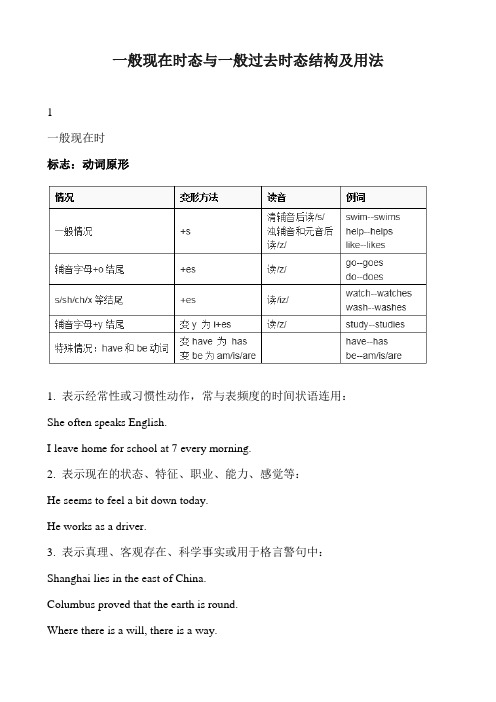
一般现在时态与一般过去时态结构及用法1一般现在时标志:动词原形1. 表示经常性或习惯性动作,常与表频度的时间状语连用:She often speaks English.I leave home for school at 7 every morning.2. 表示现在的状态、特征、职业、能力、感觉等:He seems to feel a bit down today.He works as a driver.3. 表示真理、客观存在、科学事实或用于格言警句中:Shanghai lies in the east of China.Columbus proved that the earth is round.Where there is a will, there is a way.4. 表示现在瞬间的动作:Here comes the bus!5. 表示将来1) 表按规定、计划、安排将要发生的动作(仅限于某些表示“来、去、动、停、开始、结束、继续”等的趋向动词),可以与表示未来的时间状语搭配使用。
常见的用法是:飞机、火车、轮船、汽车等定期定点运行的交通状况。
如:The next train leaves at 3 o’clock this afternoon.How often does the shuttle bus run?2) 在时间和条件状语从句中常使用一般现在时表示将来发生的事情:When Bill comes (不用will come), ask him to wait for me.I shall go there tomorrow unless I’m too busy.2一般过去时标志:动词过去式*闭音节:元音字母a, e, i, o, u如果发字母本来的音则称为开音节,否则称为闭音节。
1. 表示过去某时所发生的动作或存在的状态,常与表示过去的时间状语连用(e.g. yesterday, this morning, just now, a moment ago, in May, last night / year / week, once upon a time, the other day, before …, when …, in the past等)。
英语的四大时态用法及结构
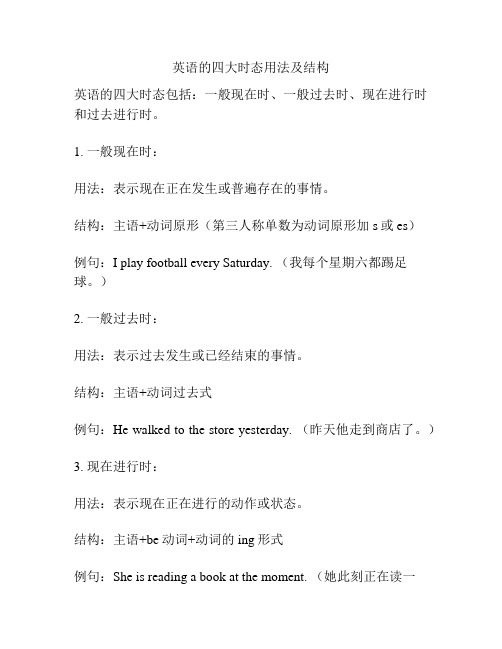
英语的四大时态用法及结构
英语的四大时态包括:一般现在时、一般过去时、现在进行时和过去进行时。
1. 一般现在时:
用法:表示现在正在发生或普遍存在的事情。
结构:主语+动词原形(第三人称单数为动词原形加s或es)
例句:I play football every Saturday. (我每个星期六都踢足球。
)
2. 一般过去时:
用法:表示过去发生或已经结束的事情。
结构:主语+动词过去式
例句:He walked to the store yesterday. (昨天他走到商店了。
)
3. 现在进行时:
用法:表示现在正在进行的动作或状态。
结构:主语+be动词+动词的ing形式
例句:She is reading a book at the moment. (她此刻正在读一
本书。
)
4. 过去进行时:
用法:表示过去某一时刻正在进行的动作。
结构:主语+was/were+动词的ing形式
例句:They were watching TV when I arrived. (我到达时他们正在看电视。
)。
一般现在时、一般过去时、一般将来时
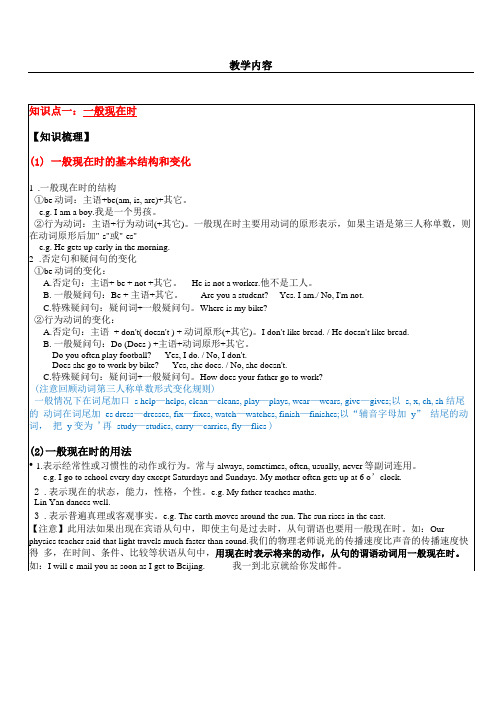
教学内容【例题精讲】例1.------ W ho is that lady?She's Miss Green. She us music, and she is so good.A. taughtB. teachesC. will teachD. is teaching 例 2. I think I'll take a bus to the meeting.A. do The bus? If you, you will be late.B. have doneC. will do例3. Unless the weather, we will have to cancel the picnic.A. improveB. improvesC. improvedD. will improve例4. We don't know if our friend .If he, we'll let you know.A. comes; comesB. comes; will come例5. Our geography teacher told us that the earth C. will come; comesthe sun.A. went aroundB. goes aroundC. is going aroundD. was going around【课堂练习】1.Look! A dog a blind man across the road.A. leadsB. leadC. is leadingD. led2.They usually TV in the evening.A. watchB. will watchC. are watchingD. watches3.He hardly up early.A. getsB. getC. doesn't getD. don't get4.John football.A. likes playingB. likes playC. like play5.Frank usually in touch with his primary school teachers by email.A. keepB. keepsC. keptD. will keep知识点二:一般过去时【知识梳理】(1)一般过去时的基本结构和变化1.定义:表示过去某时发生的动作或存在的状态。
一般现在时与一般过去时

一般现在时一.三单变化:1.多数在动词后+s 例如:play — plays like — likes2.以s ,x ,sh ,ch , o 结尾的+es,例如:go — goes wash — washes3.以辅音字母加y结尾,把y改成i再加es例如:fly — flies cry — cries在一般现在时中,当主语是第三人称单数时,谓语动词要用第三人称单数形式,即常在动词原形后加-s或-es。
二.哪些主语是第三人称单数呢?现归纳总结如下:一、人称代词he, she, it是第三人称单数。
如:He likeswatchi ng TV. 他喜欢看电视。
她十二点吃午餐。
It lookslike a cat. 它看起来像只猫。
二、单个人名、地名或称呼作主语;是第三人称单数。
如:①Han Mei lookslike her mother. 韩梅看起来像她的母亲。
②Beijin g is in China.北京在中国。
③王叔叔经常做蛋糕。
三、单数可数名词或"this / that / the+单数可数名词"作主语时,是第三人称单数。
如:①A horseis a useful animal. 马是有用的动物。
②This book is yours.这本书是你的。
③That car is red. 那辆小汽车是红色的。
④这只猫是露茜的。
四、不定代词so meone, somebo dy, nobody, everyt hing,someth ing等及指示代词t his, that作主语时,是第三人称单数。
如:①大家到齐了。
②Thereis someth ing wrongwith the watch.这块手表有毛病。
③This is a pen. 这是一支钢笔。
一般现在时和一般过去时讲解及练习
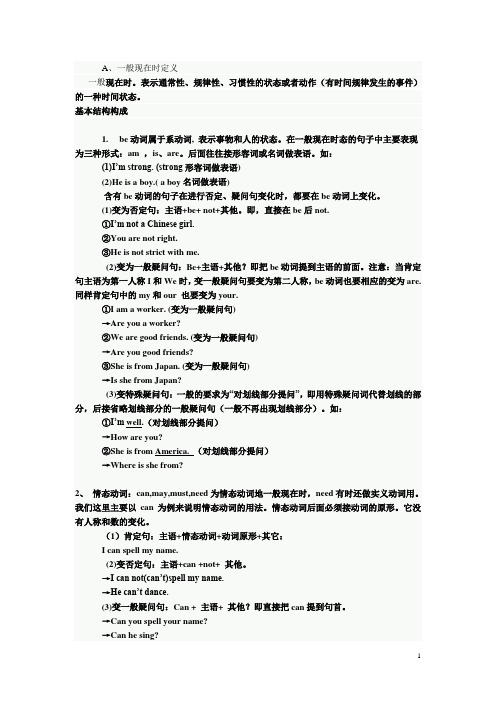
A、一般现在时定义一般现在时。
表示通常性、规律性、习惯性的状态或者动作(有时间规律发生的事件)的一种时间状态。
基本结构构成1. be动词属于系动词, 表示事物和人的状态。
在一般现在时态的句子中主要表现为三种形式:am ,is、are。
后面往往接形容词或名词做表语。
如:(1)I’m strong. (strong形容词做表语)(2)He is a boy.( a boy名词做表语)含有be动词的句子在进行否定、疑问句变化时,都要在be动词上变化。
(1)变为否定句:主语+be+ not+其他。
即,直接在be后not.①I’m not a Chinese girl.②You are not right.③He is not strict with me.(2)变为一般疑问句:Be+主语+其他?即把be动词提到主语的前面。
注意:当肯定句主语为第一人称I和We时,变一般疑问句要变为第二人称,be动词也要相应的变为are.同样肯定句中的my和our 也要变为your.①I am a worker. (变为一般疑问句)→Are you a worker?②We are good friends. (变为一般疑问句)→Are you good friends?③She is from Japan. (变为一般疑问句)→Is she from Japan?(3)变特殊疑问句:一般的要求为“对划线部分提问”,即用特殊疑问词代替划线的部分,后接省略划线部分的一般疑问句(一般不再出现划线部分)。
如:①I’m well.(对划线部分提问)→How are you?②She is from America. (对划线部分提问)→Where is she from?2、情态动词:can,may,must,need为情态动词地一般现在时,need有时还做实义动词用。
我们这里主要以can为例来说明情态动词的用法。
情态动词后面必须接动词的原形。
一般现在时与一般过去时练习题及答案
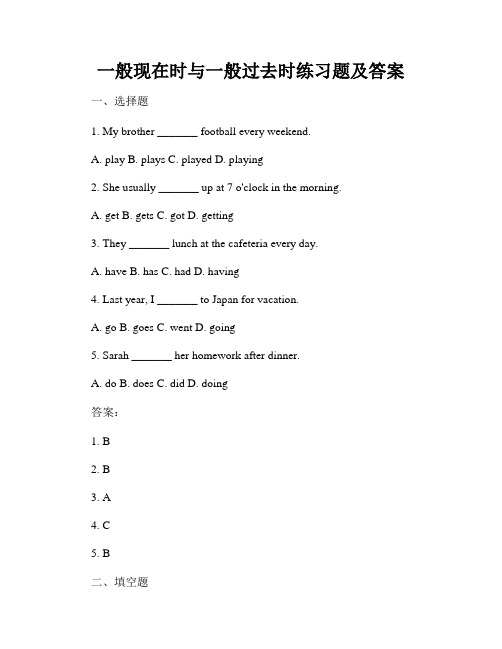
一般现在时与一般过去时练习题及答案一、选择题1. My brother _______ football every weekend.A. playB. playsC. playedD. playing2. She usually _______ up at 7 o'clock in the morning.A. getB. getsC. gotD. getting3. They _______ lunch at the cafeteria every day.A. haveB. hasC. hadD. having4. Last year, I _______ to Japan for vacation.A. goB. goesC. wentD. going5. Sarah _______ her homework after dinner.A. doB. doesC. didD. doing答案:1. B2. B3. A4. C5. B二、填空题1. They often _______ (watch) movies at the cinema on weekends.2. My father usually _______ (read) the newspaper in the evening.3. Last month, we _______ (travel) to Europe.4. She _______ (not like) coffee, she prefers tea.5. Yesterday, I _______ (meet) my old friend at the park.答案:1. watch2. reads3. traveled4. doesn't like5. met三、改错题1. He go to school by bus every day.改为:He goes to school by bus every day.2. We saw a movie yesterday evening.改为:We see a movie yesterday evening.3. They doesn't like swimming in the pool.改为:They don't like swimming in the pool.4. Last weekend, she went to shopping with her friends.改为:Last weekend, she went shopping with her friends.5. My sister usually cook dinner for the family.改为:My sister usually cooks dinner for the family.答案:1. go → goes2. s aw → see3. doesn't → don't4. to shopping → shopping5. cook → cooks四、句型转换1. He watches TV every evening. (改为否定句)He doesn't watch TV every evening.2. They played soccer yesterday. (改为一般疑问句)Did they play soccer yesterday?3. She goes to the gym twice a week. (对划线部分提问) How often does she go to the gym?4. I usually eat breakfast at 7 o'clock. (改为过去时态)I usually ate breakfast at 7 o'clock.5. The cat sleeps all day. (改为否定句)The cat doesn't sleep all day.答案:1. 否定句:He doesn't watch TV every evening.2. 一般疑问句:Did they play soccer yesterday?3. 对划线部分提问:How often does she go to the gym?4. 过去时态:I usually ate breakfast at 7 o'clock.5. 否定句:The cat doesn't sleep all day.总结:通过这些练习题,我们可以巩固和加深对一般现在时和一般过去时的理解和应用。
闽教版小学英语六年级三大时态(一般现在时、一般过去时、一般将来时..
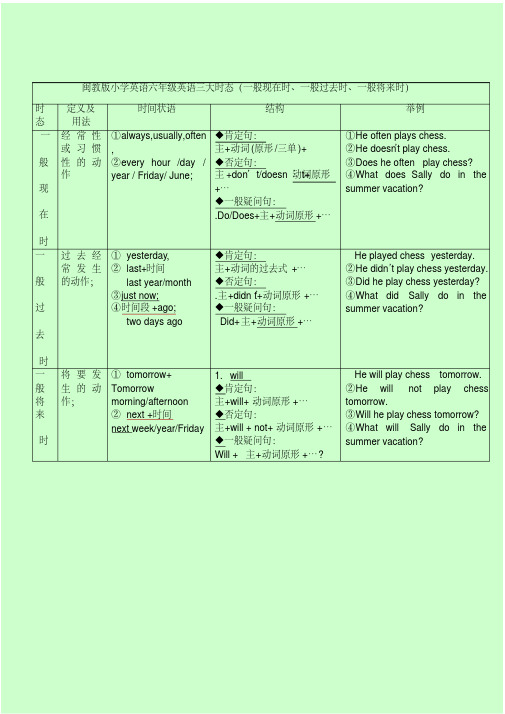
闽教版小学英语六年级英语三大时态(一般现在时、一般过去时、一般将来时)时态定义及用法时间状语结构举例一般现在时经常性或习惯性的动作①always,usually,often,②every hour /day /year / Friday/ June;◆肯定句:主+动词(原形/三单)+◆否定句:主+don’t/doesn’t+动词原形+…◆一般疑问句:.Do/Does+主+动词原形+…①He often plays chess.②He doesn’t play chess.③Does he often play chess?④What does Sally do in thesummer vacation?一般过去时过去经常发生的动作;①yesterday,②last+时间last year/month③just now;④时间段+ago;two days ago◆肯定句:主+动词的过去式+…◆否定句:.主+didn’t+动词原形+…◆一般疑问句:Did+主+动词原形+…He played chess yesterday.②He didn’t play chess yesterday.③Did he play chess yesterday?④What did Sally do in thesummer vacation?一般将来时将要发生的动作;①tomorrow+Tomorrowmorning/afternoon②next +时间next week/year/Friday1.will◆肯定句:主+will+动词原形+…◆否定句:主+will + not+动词原形+…◆一般疑问句:Will + 主+动词原形+…?He will play chess tomorrow.②He will not play chesstomorrow.③Will he play chess tomorrow?④What will Sally do in thesummer vacation?一、选择题( ) 1.Ben usually at 6:40. A.got up B.get up C.gets up ( ) 2.In the past my mother my bed. A.make B.made C.makes ( ) 3.Where you in the summer vacation?A.areB.isC.were( ) 4.Did you a good time in the USA?’tA.have; Yes,I didB.had; Yes,I didC.have; No,I don( ) 5.Do you often do housework at home?A.Yes,I does.B.No,I don’t.C.Yes,I am.( ) 6.Does he clean his room now?’t.A.Yes,she does.B.Yes,he does.C.No,he don( ) 7.li Hong usually at 6:30 in the morning.But this morning she at 7:00.A. get;gotB. gets;getC.gets;got( ) 8. How Mike go to school every day?A.doB.isC.doesD.are( ) 9. The students the football match now.A.watchB.to watchC.are watchingD.watching( ) 10. Did you your room yesterday?A.cleanB.cleansC. cleanedD.cleaning二、填空题1.Listen,there are many students (sing)in the classroom.2.. Look! Sarah is (dance).3. My mother often (wash)clothes on the weekends.4. He (buy) a present for his mother yesterday.5. John (visit)Qingdao next Sunday.6.He usually____(go) to school on foot.7.Does she_____(go) to school on foot?8.Did she ____(go) to school on foot?9.They_____(go) to school on foot yesterday.10.____ she going to school on foot?助动词do,does,did或者它们的否定形式的使用1) you like this magazine?2) The girl like bread for breakfast.3) ---What she at the weekends?---She usually plays games with her friends.4) ---What you do last Sunday? ---I wrote to my friend.5) -- He not visit a farm last National Day holiday.6) They not like playing volleyball.7) --- Jim have a picnic with his family every Saturday?---Yes, he8) Helen with Yang Ling go to school by bike every day? 9) [Do/Does]______ you go to school everyday? No, I don’t. 10) [Do/Does]______ Jack and Peter like apples?11)[Do/Does]______ he watch TV at night? Yes he does. 三.连词成句(请注意大小写)1. the summer you where were in vacation2.did do yesterday what youA good did have time the you in a4. Wang Tao his yesterday did make bed?5. does often housework home Sally at do6.will where you for the go holidays7. to bookstore yesterday he went the.。
一般现在时与一般过去式的比较

4)疑问词+can +主语+V原形+其他?
What can you sing ?
一般过去时:
1)疑问词+was/were 主语+其他? Where were you yesterday ? 2)疑问词+did+主语+V原形+其他? Where_____you_____(go) just now ? 3)疑问词+could +主语+V原形+其他? What could you do when you were 5 ?
二、否定句: 一般现在时: 1)主语+am/is/are not+其他 I am not a student. '2)主语+don't/doesn't +谓+宾+... I/You/They don't play soccer after school. He/She/Jim doesn't play soccer after school. 3)主语+can't+V原形+其他
五、关键词 一般现在时: often(经常)、usually(通常),sometimes(有时),always(总 是),seldom(很少,几乎没有),never(从来没有),Every day/week/month/year(每天/周/月/年),on Sunday(在星期天), once a week(一周一次),in the morning/afternoon/evening(在 早上/下午/晚上)等时间状语连用。
一般过去时: 1)表示过去的状态 I was happy yesterday. 2)表示过去时间里经常性/习惯性的动作。 She often watched TV after supper last year. 3)表示主语过去的性格/能力。 She could play the guitar when she was 10.
- 1、下载文档前请自行甄别文档内容的完整性,平台不提供额外的编辑、内容补充、找答案等附加服务。
- 2、"仅部分预览"的文档,不可在线预览部分如存在完整性等问题,可反馈申请退款(可完整预览的文档不适用该条件!)。
- 3、如文档侵犯您的权益,请联系客服反馈,我们会尽快为您处理(人工客服工作时间:9:00-18:30)。
1、【定义】
一般现在时表示现在经常反复发生的动作、存在的状态或习惯性的动作。
2、【结构】
构成:主语+动词原形……
温馨提示:Be动词的第一人称单数形式为am,第三人称单数形式为is,其他人称形式为are;单数及不可数名词用is,复数名词用are。
一般现在时用实意动词的原形,但第三人称单数作主语时,动词要用单三式。
(一般的动词词尾+s,以sh/ch/s/x结尾的词+es,以辅音字母y 结尾的把y变成i再+es。
辅音字母+o结尾的+es.)
【否定结构】
Be动词否定句式:主语 + be(am, is, are) + not + 其它.
实意动词否定句式:主语 + don’t + 动词(原形)+ 其它【do not = don’t】
情态动词否定句式:主语 + 情态动词+ not + 其它.
3、【时间状语】
always, usually, often, sometimes, every week (day, year, month…), once a week, on Sundays ……
He usually plays football on Sundays. 他通常在周末踢足球。
4、【被动语态】
英语中有主动语态和被动语态之分。
主动语态表示主语是动作的执行者,而被动语态则表示主语是动作的承受者。
一般现在时的被动语态由“助动词be(am, is, are)+ 实意动词的过去分词”构成。
Such books are written for children.
这些书是为孩子们写的。
【当堂检测】
1. Every year many foreigners ______ to China to learn Chinese.
A. have come
B. comes
C. came
D. come
2. A knife ______ for cutting.
A. am
B. is
C. are
D.be
3. I ______ ten yuan by my father every day.
A. am giving
B. give
C. gives
D. giving
根据提示完成句子。
4. We often______(play) in the playground.
5. Mike sometimes ________(go) to the park with his sister.
6. Our classroom ________________ (clean) by us every day.
改错。
7. There is three books in my backpack.
8. She watchs TV every night.
BBA play goes is cleaned 7. is→are 8. watchs→watches
1、【定义】
一般过去时用来表示过去某一时间内发生的动作或存在的状态以及过去习惯性、反复性的动作。
2、【结构】
构成:主语+动词过去式……
温馨提示:be 动词am和is 的过去式为was,are的过去式为were。
实意动词肯定句要使用动词的过去式,否定句和疑问句要使用助动词do和 does 的过去式 did.。
【否定结构】
Be动词否定句式:主语 + be(was , were) + not + 其它.
实意动词否定句式:主语 + didn’t + 动词(原形)+ 其它【did not = didn’t】
情态动词否定句式:主语 + 情态动词过去式 + not + 其它.
情态动词的过去式:can→could , may→might , must→must ,will-would,shall-should.
3、【时间状语】
在实际应用中,一般过去时常与以下时间状语连用:
yesterday , the day before yesterday , last + 时间 , this morning 时间 + ago , just now , a moment ago , in + 过去的时间
He played football with his friends yesterday. 他通常在周末踢足球。
4、【被动语态】
一般现在时的被动语态由“助动词be(was,were)+ 实意动词的过去分词”构成,其否定式是在was 和were后加not。
【当堂检测】
1. She lived there before he ____ to China
A. came
B. comes
C. come
D. coming
2.When did you ____here?
A. got to
B. reached
C. arrive in
D. Reach
3. I____ my homework at 7:00 yesterday evening.
A. finished
B. would finish
C. was finishing
D. finish
完成句子。
4. I _________ (have) an exciting party last weekend.
5. She _________(not visit) her aunt last weekend.
6. Someone _________(steal) my bike last night.
7. My bike _________(steal) last night.
改错。
6. He go to school by bus last week.
7. He often goes home at 6:00 last month.
ABA had didn’t visit stole was stolen go→went goes→went。
